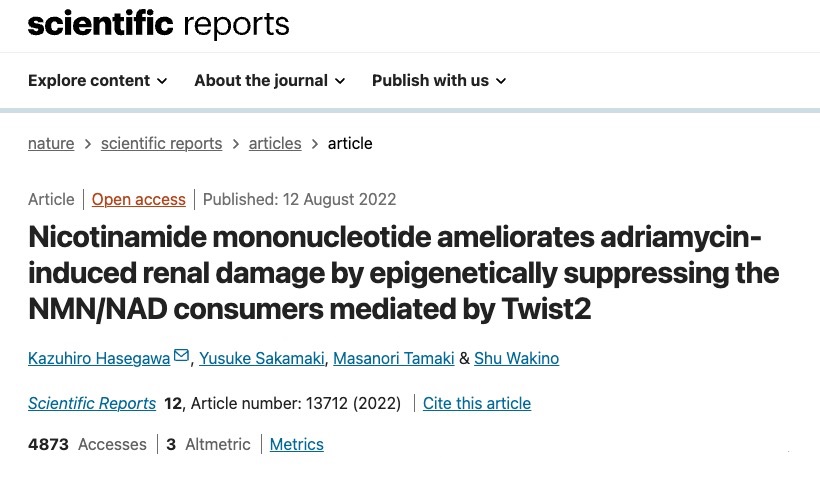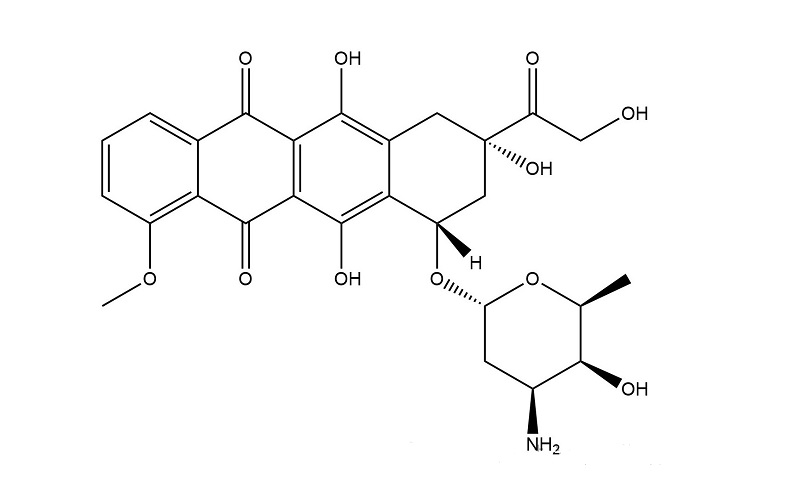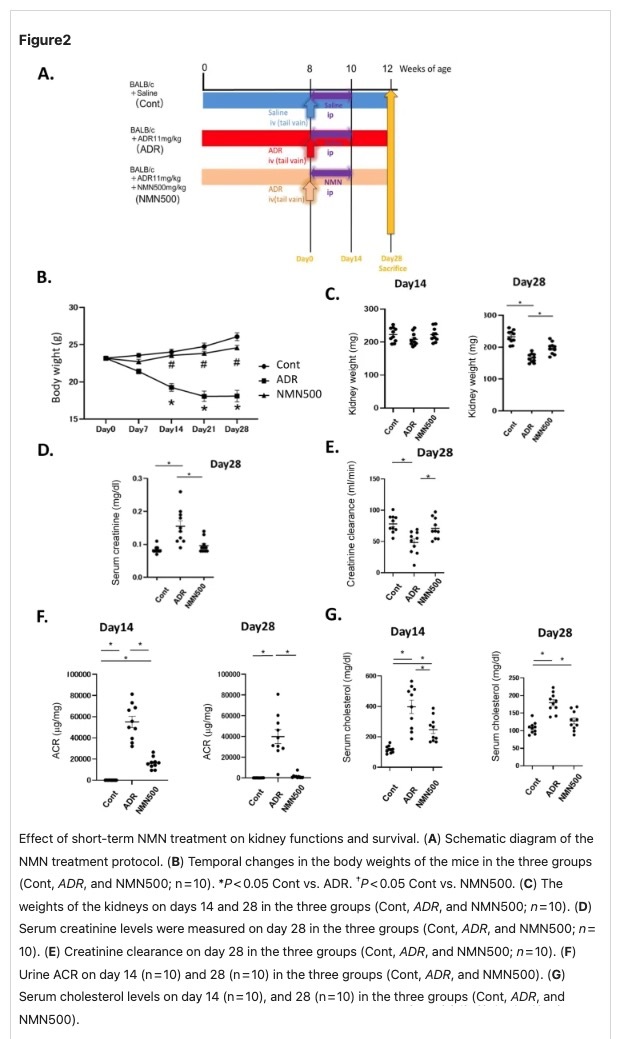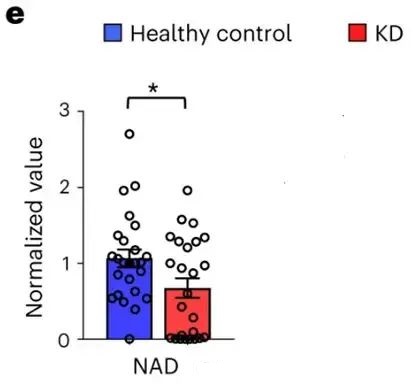
Oct 19, 2024 / Author: China Glutathione suppliers & NMN manufacturers
A groundbreaking study has been discovered in the journal Scientific Reports, revealing that NMN has a significant protective effect against doxorubicin (ADR) - induced focal glomerulosclerosis (FSGS) and elucidating the epigenetic regulatory mechanisms behind it.
This study not only enhances our understanding of the treatment of kidney injury, but also brings new possibilities for patients with focal glomerulosclerosis.

As a chemotherapeutic drug, doxorubicin has a broad anti-tumor spectrum and is applicable to acute leukemia (lymphocytic and granulocytic), malignant lymphoma, breast cancer, bronchogenic lung cancer (undifferentiated small cell and non small cell), ovarian cancer, soft tissue sarcoma, osteosarcoma, rhabdomyosarcoma, Ewing sarcoma, blastoma, neuroblastoma, bladder cancer cancer, thyroid cancer, prostate cancer, head and neck squamous cell carcinoma, testicular cancer, gastric cancer, liver cancer, etc.

Although effective in combating various cancers, one of its side effects is the possibility of causing renal dysfunction, especially leading to focal glomerulosclerosis, characterized by glomerular damage, sclerosis, and interstitial fibrosis.
In this study, researchers administered short-term NMN treatment to 8-week-old BALB/c mice, which were divided into two groups receiving either physiological saline or ADR treatment.
NMN was administered intraperitoneally to ADR treated mice at a dose of 500 mg/kg/day for 14 consecutive days.

The results showed that NMN treatment significantly reduced the urinary albumin excretion in ADR treated mice. This is an important biomarker for evaluating kidney damage, and the decrease in urinary albumin excretion indicates that NMN treatment helps protect the filtering function of the kidneys and slows down the progression of kidney disease.
Even short-term NMN treatment can maintain its protective effect on the kidneys after discontinuation of treatment. This may be related to the long-term activity of Sirt1 activated by NMN, indicating that NMN has the potential to alter the progression of kidney disease.
After further experiments, researchers found that the therapeutic effect of NMN on focal glomerulosclerosis is related to the increase in NAD+levels in the kidneys. Higher NAD+levels activate Sirt1 protein and regulate a series of biochemical processes, thereby maintaining the physiological function of the kidneys.
In 2021, the research team found that NMN also has therapeutic effect on diabetes nephropathy in mice.
Sustak and his colleagues from the University of Pennsylvania published a study in Nature Metabolism in 2023, which showed that NAD+deficiency is a potential factor associated with kidney disease. The NAD+level in diseased kidneys (KD) is significantly lower than that in healthy kidneys.

Researchers measured NAD levels in kidney disease patients and compared them with healthy adults. They found that NAD+levels were significantly reduced in adults with kidney disease.
And NMN is a precursor molecule of nicotinamide adenine dinucleotide (NAD+), which is a metabolite of all living cells. NAD+is a key component of fundamental biological processes, including DNA repair and energy metabolism, as well as important processes for cellular function and tissue health.
Due to the high metabolic activity of kidney cells, they are highly sensitive to NAD+consumption and ATP production impairment.
To test the effect of NMN on renal scars, scientists tested the effect of NMN on cultured kidney cells. Specifically, they investigated whether treating damaged human kidney cells with dissolved NMN could reduce DNA damage and aging, a program that shuts down cell proliferation associated with aging.
They induced kidney cell damage, or so-called ischemia, using chemical hydrogen peroxide and hypoxia, and then treated these cells with NMN (1 mM). Researchers in Beijing have found that NMN increases cell vitality while also reducing the number of aging non proliferating cells. Most importantly, NMN slows down the DNA damage process in damaged kidney cells.
Supplementing NAD+levels by administering its precursors (such as NMN) has been shown to have beneficial effects on fibrosis and age-related diseases. Therefore, by preventing DNA damage and metabolic dysfunction, NMN may have the potential to alter renal fibrosis.
1. Delaying renal function decline: Aging can lead to a decrease in NAD+production and gradual decline in renal function. The intake of NMN can promote NAD+production, improve cellular energy metabolism efficiency, and thus slow down the aging process of the kidneys.
2. Improving glomerular function: The role of NMN is not limited to the cellular level, but can also involve the glomerulus. Research has shown that the intake of NMN can promote the reconstruction and repair of glomeruli, enhance their filtration function, and thus protect the kidneys from damage.
3. Relieve inflammatory response: Kidney disease often accompanies inflammatory response. As an antioxidant, NMN can alleviate inflammatory reactions and repair damaged kidney tissue.
4. Promote kidney repair: The application of NMN can stimulate the proliferation and generation of stem cells in the kidneys, promote tissue repair processes, and enhance kidney regeneration ability.
(1) Nicotinamide Mononucleotide ameliorates adriamycin-induced renal damage by epigenetically suppressing the NMN/NAD consumers mediated by Twist2 | Scientific Reports (nature.com)
(2) Yasuda, I., Hasegawa, K., Sakamaki, Y., Muraoka, H., Kawaguchi, T., Kusahana, E., Ono, T., Kanda, T., Tokuyama, H., Wakino, S., & Itoh, H. (2021). Pre-emptive Short-term Nicotinamide Mononucleotide Treatment in a Mouse Model of Diabetic Nephropathy. Journal of the American Society of Nephrology : JASN, 32(6), 1355–1370. https://doi.org/10.1681/ASN.2020081188
(3) Jia Y, Kang X, Tan L, Ren Y, Qu L, Tang J, Liu G, Wang S, Xiong Z and Yang L (2021) Nicotinamide Mononucleotide Attenuates Renal Interstitial Fibrosis After AKI by Suppressing Tubular DNA Damage and Senescence. Front. Physiol. 12:649547. doi: 10.3389/fphys.2021.649547
Supplier Introduction: China glutathione supplier and NMN manufacturer GSHworld, the company mainly develops biotechnology and industrialization. As a global pioneer in enzymatic catalytic ATP regeneration technology, our company advocates green production and is committed to providing customers with better and more environmentally friendly products and services. Glutathione Manufacturer,NMN Factory,Citicoline Sodium supplier,China NMN manufacturers
PREVIOUS:NMN regulates mitochondrial stress response to improve Alzheimer disease
NEXT:Top 10 Health benefits of taking NMN for middle-aged and elderly people
+86-755-23577295
+86 18718790084
Room 832, Building 12, Shenzhen Bay Science and Technology Ecological Park, Yuehai Street, Nanshan District, Shenzhen China